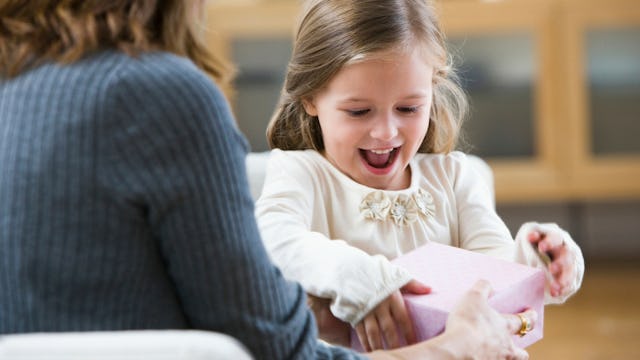Giving Used Gifts Is The Way To Go, And This Is Why

My daughter and I are wandering through The Hope Center, one of our local thrift shops, when a box catches my eye. I see Lord of the Rings first, then two inscribed rings (gold and silver) and then the words “Checkers, Collector’s Edition.”
I pry off the metal lid, which is in good condition, except for a tiny dent in the corner. Inside are two sets of checkers, made to look like gold and silver rings engraved in Elvish. No pieces are missing. I open the game board, which is delightfully medieval-looking. Nothing wrong with it.
“Wouldn’t this be great for Jessie?” I ask my daughter. Her friend is a Lord of the Rings fanatic, and she has a birthday coming up.
My daughter’s face lights up. “Yes! This is perfect!” she says.
Out of curiosity, I pull out my phone and check Amazon. There’s only one of these sets for sale that’s new, and it’s $44.00. The one we’re looking at is marked $4.99.
We plunk down our five dollars and some change, and walk out with a perfect birthday gift.
Our close group of friends has created a culture of giving that largely includes buying used items for one another. And it’s awesome.
We give books from used bookstores, great thrift and garage store finds, and even the occasional re-gifted item. And we don’t hide that fact. We’re all on the same page that gently used gifts are not only perfectly acceptable, but in many ways preferable to new.
There are some unspoken rules of etiquette that say we shouldn’t give people used gifts, but I think it’s high time we changed those rules. And to state my case, I give you just a few reasons for giving (gently) used gifts that will have you running to your local thrift shop:
It’s good for the environment.
Humans make too much stuff. I’d rather someone buy me a perfectly good used coffee mug that already exists than one that had to be made with new materials. Not to mention saving that mug from a landfill. Reduce, reuse, recycle isn’t just a slogan. It’s the recipe for sustainable life on our planet.
It’s good for the pocketbook.
We’ve spent the past decade emerging from the Great Recession, and many Americans are still recovering financially. If I can buy you something gently used, but equally good as something new for a fraction of the price, why would that be a problem? If it’s truly the thought that counts, and not the price of a gift, then there’s no reason a thrift store find should be frowned upon.
It’s good for charity.
Not all, but many thrift stores are used to fund charitable work. The Hope Center, where we found the Lord of the Rings checkers set, helps marginalized people find jobs. Others around town help fund shelters and various aid programs. So not only are you saving money, but the money you’re spending is also going toward a good cause. Win-win.
It’s good for kids to see that new isn’t always necessary.
We live in a consumer culture where new is best and newer is better. We want the latest of everything. We are marketed to relentlessly, with companies trying to pressure us into buying the latest styles and versions of everything. But when you step back and look at the whole picture, it’s pretty clear that those messages are simply manipulations. I don’t want my kids to fall prey to that mindset.
Of course, there are limits here, and there are a lot of things that one should not buy or give used. Carseats should never be acquired second-hand, for instance. I wouldn’t give someone used items that would go in a baby’s mouth or that could obviously be contaminated in some way. But typical gift items like books, games, clothing, and the like are all fair game in my book.
I know some people bristle at the idea of giving someone something used, but I think it’s time we start changing gift-giving culture to embrace gently used items. The only downside is the perception of value, which is a pretty shallow measure if you ask me. Even if we just start making this shift among our close friends and family, we can create more wallet-wise, earth-friendly gifting habits that benefit everyone.
This article was originally published on